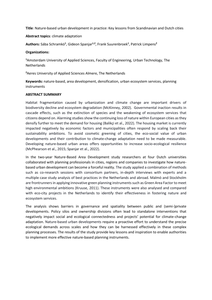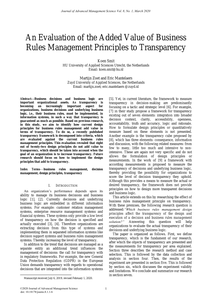Abstract from AMS Scientific Conference '24, Amsterdam, Netherlands.In the two-year Nature-Based Area Development study researchers at four Dutch universities collaborated with planning professionals in cities, regions and companies to investigate how nature-based urban development can become a forceful reality. The study applied a combination of methods such as co-research sessions with consortium partners, in-depth interviews with experts and a multiple case study analysis of best practices in the Netherlands and abroad.Keywords: nature-based, area development, densification, urban ecosystem services, planning instruments
DOCUMENT

Caribbean coral reefs are in decline and the deployment of artificial reefs, structures on the sea bottom that mimic one or more characteristics of a natural reef, is increasingly often considered to sustain ecosystem services. Independent of their specific purposes, it is essential that artificial reefs do not negatively affect the already stressed surrounding habitat. To evaluate the ecological effects of artificial reefs in the Caribbean, an analysis was performed on 212 artificial reefs that were deployed in the Greater Caribbean between 1960 and 2018, based on cases documented in grey (n = 158) and scientific (n = 54) literature. Depending on the availability of data, reef type and purpose were linked to ecological effects and fisheries management practices around the artificial reefs. The three most common purposes to deploy artificial reefs were to create new dive sites (41%), toperform research (22%) and to support ecosystem restoration (18%), mainly by stimulating diversity. Ship wrecks (44%), reef balls© (13%) and piles of concrete construction blocks (11%) were the most-often deployed artificial reef structures and metal and concrete were the most-used materials. The ecological development onartificial reefs in the Caribbean appeared to be severely understudied. Research and monitoring has mostly been done on small experimental reefs that had been specifically designed for science, whereas the most commonly deployed artificial reef types have hardly been evaluated. Studies that systematically compare the ecological functioning of different artificial reef types are virtually non-existent in the Caribbean and should be a research priority, including the efficacy of new designs and materials. Comparisons with natural reef ecosystems are scarce. Artificial reefs can harbor high fish densities and species richness, but both fish and benthos assemblages often remain distinct from natural ecosystems. Studies from other parts of the world show that artificial reefs can influence the surrounding ecosystem by introducing non-indigenous species and by leaking iron. As artificial reefs attract part of their marine organisms from surrounding habitats, intensive exploitation by fishers, without clear management, can adversely affect the fish stocks in the surrounding area and thus counteract any potential ecosystem benefits. This study shows that over 80% of artificial reefs in the Caribbean remain accessible tofishers and are a risk to the surrounding habitat. To ensure artificial reefs and their fisheries do not negatively affect the surrounding ecosystem, it is imperative to include artificial reefs, their fisheries and the surrounding ecosystem in monitoring programs and management plans and to create no-take zones around artificial reefs that are not monitored.
DOCUMENT

Research shows that neurominorities face barriers in achieving their career potential. Hence, there is an increasing need for insights into how a neuro-inclusive and sustainable career ecosystem can be fostered. This study aims to shed light on the strengths-based practices implemented in organizations to develop sustainable career ecosystems for and with neurodivergent workers. This qualitative study is based on in-depth interviews with 31 participants (i.e. HR professionals, line managers and [neurodivergent] employees), follow-up focus groups with 12 participants and a survey with open-ended questions. A hybrid thematic analysis was used to analyze the data.
MULTIFILE
The implementation of marine spatial plans as required by the Directive on Maritime Spatial Planning (MSP) of the European Union (EU) poses novel demands for the development of decision support tools (DST). One fundamental aspect is the need for tools to guide decisions about the allocation of human activities at sea in ways that are ecosystem-based and lead to sustainable use of resources. The MSP Directive was the main driver behind the development of spatial and non-spatial DSTs for the analysis of marine and coastal areas across European seas. In this research we develop an analytical framework designed by DST software developers and managers for the analysis of six DSTs supporting MSP in the Baltic Sea, the North Sea, and the Mediterranean Sea. The framework compares the main conceptual, technical and practical aspects, by which these DSTs contribute to advancing the MSP knowledge base and identified future needs for the development of the tools. Results show that all of the studied DSTs include elements to support ecosystem-based management at different geographical scales (from national to macro-regional), relying on cumulative effects assessment and functionalities to facilitate communication at the science-policy interface. Based on our synthesis we propose a set of recommendations for knowledge exchange in relation to further DST developments, mechanisms for sharing experience among the user-developer community, and actions to increase the effectiveness of the DSTs in MSP processes.
LINK
Business Rule Management (BRM) is a means to make decision-making within organizations explicit and manageable. BRM functions within the context of an Enterprise Architecture (EA). The aim of EA is to enable the organization to achieve its strategic goals. Ideally, BRM and EA should be well aligned. This paper explores through study of case study documentation the BRM design choices that relate to EA and hence might influence the organizations ability to achieve a digital business strategy. We translate this exploration into five propositions relating BRM design choices to EA characteristics.
DOCUMENT

The digital era has brought about profound changes in how music is created, distributed, and consumed, posing a need for modernizing the Dutch collective management system of music copyright to match the rapidly changing digital music industry. This study aims to identify the key stakeholders and their perceptions of the Dutch system of collective management of music copyright. Utilizing qualitative document analysis, the study examines a range of public and non-public documents, including income statements, annual reports from Collective Management Organizations (CMOs), and contracts between publishers and creators. The research is further enriched by twenty-four semi-structured interviews with key stakeholders such as composers, lyricists, music publishers, copyright lawyers, and CMO executives. The findings of the study highlight several issues like the outdated IT systems and the lack of data standardization within the system. The research also notes a contrast in organizational effectiveness: major publishers are well-organized and unified in their negotiations with Digital Service Providers (DSPs) and CMOs, effectively advocating for their rights. However, music copyright holders, despite their legal homogeneity, are either unorganized or ineffectively aligned, displaying diverse interests and varying levels of access to information, as well as differences in norms and values prioritization. The study is grounded in the economics of collective management (ECM) and makes a significant academic contribution to this field by introducing new empirical findings to ECMs core constructs and integrating theoretical perspectives. The research offers valuable insights for policymakers, industry stakeholders, and researchers, aiming to foster a more equitable music copyright management system in the digital context.
MULTIFILE

Immersive technologies are redefining and revolutionizing the staging of experiences and co-creation of value, implicating the management of customer experiences. However, limited studies have looked at the role of immersive technologies as part of the customer experience management (CXM) process. Incorporating the concepts of experience economy and value co-creation, this study proposes a dynamic CXM framework that highlights the emerging field of immersive technologies like augmented and virtual reality as part of business and marketing research. The framework acts as a guide for researchers and industry practitioners to initiate immersive technology ventures that are rooted in the co-creation and management of customer experiences
MULTIFILE
Managing and supporting the collaboration between different actors is key in any organizational context, whether of a hierarchical or a networked nature. In the networked context of ecosystems of service providers and other stakeholders, BPM is faced with different challenges than in a conventional hierarchical model, based on up front consolidation and consensus on the process flows used in collaboration. In networked ecosystems of potential business partners, designing collaboration upfront is not feasible. Coalitions are formed situationally, and sometimes even ad-hoc. This paper presents a number of challenges for conventional BPM in such environments, and explores how declarative process management technology could address them, indicating topics for further research.
MULTIFILE

Business decisions and business logic are important organizational assets. As transparency is becoming an increasingly important aspect for organizations, business decisions and underlying business logic, i.e., their business rules, must be implemented, in information systems, in such a way that transparency is guaranteed as much as possible. Based on previous research, in this study, we aim to identify how current design principles for business rules management add value in terms of transparency. To do so, a recently published transparency framework is decomposed into criteria, which are evaluated against the current business rules management principles. This evaluation revealed that eight out of twenty-two design principles do not add value to transparency, which should be taken into account when the goal of an organization is to increase transparency. Future research should focus on how to implement the design principles that add to transparency.
DOCUMENT

Through the commodification of nature, the framing of the environment as a ‘natural resource’ or ‘ecosystem service’ has become increasingly prominent in international environmental governance. The economic capture approach is promoted by international organizations such as the United Nations Environmental Program (UNEP) through Reducing Emissions from Deforestation and Forest Degradation (REDD), Payments for Ecosystem Services (PES) and The Economics of Ecosystems and Biodiversity (TEEB). This paper will inquire as to how forest protection is related to issues of social and ecological justice, exploring whether forest exploitation based on the top-down managerial model fosters an unequitable distribution of resources. Both top-down and community-based approaches to forest protection will be critically examined and a more inclusive ethical framework to forest protection will be offered. The findings of this examination indicate the need for a renewed focus on existing examples of good practice in addressing both social and ecological need, as well as the necessity to address the less comfortable problem of where compromise appears less possible. The conclusion argues for the need to consider ecological justice as an important aspect of more socially orientated environmental justice for forest protection. https://doi.org/10.1017/S0376892916000436 https://www.linkedin.com/in/helenkopnina/
MULTIFILE
